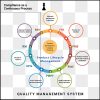The medtech regulatory environment in Europe has entered a new era. A Europe-wide medical device regulation has come into effect, presenting both challenges and opportunities for stakeholders in the sector.
This has been a long time coming. Introduced in April 2017, the Medical Device Regulation (2017/745) (MDR) took effect on May 26 of this year. The MDR sets the “rules concerning the placing on the market, making available on the market or putting into service of medical devices for human use and accessories for such devices” in the EU. The In-Vitro Diagnostic Medical Device Regulation (2017/746) (IVDR) is set to follow in May of next year.
While some might view increased regulation as a challenge for companies, I believe that it is in fact an opportunity. In more than 25 years working in artificial intelligence, I have come to appreciate the importance of an ethical and rights-based approach to the development and use of new technology. I have worked extensively on the ethics of technology, helping explore and define AI ethics guidelines and policy for the European Commission and other groups. I strongly believe that while the MDR and IVDR introduce rigorous requirements and expectations for medical devices, they are intrinsic to the acceptance and sustainability of such advanced technologies. All EU regulations start with protecting the fundamental rights of the individual citizen, but ultimately, they will protect companies as well. Consumers expect technology to be trustworthy. Corporations welcome guidance on the requirements for trustworthiness. It’s all about building an ecosystem of trust.
Benefits for MedTech Companies
Any time new regulations are introduced, companies will have questions and concerns about maintaining autonomy and the ability to innovate. However, the MDR and IVDR can serve as guardrails for companies and even generators of new IP. The following are a few of the positive impacts and opportunities I see for medtech companies:
Clarity. The MDR and IVDR establish structures and culture that increase safety and reliability for patients. The advantage for industry is that it gains clarity on regulatory expectations and standards. Companies have a clear understanding of what the regulatory expectations and obligations are, which regulatory authorities are involved and how to deal with them.
Consumer Trust. Today’s consumers expect regulation and oversight for most technology, including the medical devices that serve their health. They also understand the importance of their personal data—and the vulnerabilities. Meeting regulatory standards gives technology the independent trustworthiness that is expected in the market.
Risk Mitigation. Working in a domain that isn’t well regulated can create an unacceptable level of uncertainty and risk. Being on the wrong side of public opinion can be catastrophic for a company, particularly in an era dominated social media and public discourse. The MDR and IVDR regulations ensure companies have a line in the sand and that they know exactly where that line is.
Business Development. In some areas, the MDR and IVDR may actually spark innovation. Compliance may require some companies to create new testing protocols and methodologies, for example. They then have a commercial opportunity to create new business lines around these advancements.
As technology and the ethics around it become ever more complex, regulation is key. The alternative—having weak or regulatory vacuum—leaves companies vulnerable. The downsides far outweigh the cost of complying with the regulations.
Industry Participation
European regulations are comprehensive and specific, but the considerations that go into forming them also are very rich, and industry leaders have a role to play. Medtech companies with concerns about the regulatory future of their industry in Europe have many opportunities to make their voices heard. The formation of European regulations is a transparent process—the doors of policymakers in Brussels are open to all parties affected by the regulations. There are open consultation and feedback processes. Any company that wants to trade in the European market is welcome to join in and contribute their perspectives. In fact they are encouraged to do so.
Participation in the European regulatory process may also have broader implications. In recent years, we’ve seen that many EU regulations often align with, and in many cases provided leadership for, other international policies and standards. For example, in the US, many states have adopted policies complementary to the General Data Protection Regulation (EU) 2016/679 (GDPR). Being part of the conversation while these regulations are in development is important, as many companies will face them sooner rather than later, in the EU and beyond.
Support in Ireland
Companies seeking to undertake medtech R&D in Europe and sell to the European market will find additional support structures in place—particularly in Ireland. The Irish government has put structures and mechanisms in place to help medtech companies navigate regulations more readily, including the existing GDPR, the new MDR and IVDR, and any future regulations on AI and other relevant topics.
First, there are three National Research Ethics Committees (NRECs)—one for medical devices and two for clinical trials. The NRECs are responsible for providing ethics opinions in prescribed areas of health research, with the aim of providing single national ethics determinations that are respected nationally. Additionally, the Health Research Consent Declaration Committee (HRCDC) was formed to assess and make consent declarations in situations where explicit or informed consent is not possible, or maybe compromised in some way.
The NRECs and HRCDC were designed to be an accessible asset for the health research and innovation community, including the medtech industry. Engaging with these organizations will result in the approvals necessary for regulatory compliance, creating a one-stop shop for vital support.
I asked Dr. Jennifer Ralph James, head of the National Office for Research Ethics Committees, for her recommendations for U.S. medtech companies. She offered the following perspective. “The EU Medical Device Regulation will harmonize how research in this area is conducted across the Member States, including a lifecycle approach to safety and a ‘risk-based’ classification that reflects current innovation in the sector. The Irish regulatory environment for medical devices will be transformed by the launch of a national research ethics committee dedicated to clinical investigations of medical devices.”
“Advice for U.S. companies is to engage early with local European regulators, which for Ireland includes the National Office for Research Ethics Committees and the Health Products Regulatory Authority,” she added.
In-Market Expertise
Everyone involved wants a healthy, competitive medtech sector and everyone wants to ensure that European citizens have access to the best medtech on the market. That means creating a system where companies can get their best products to market in Europe.
IDA Ireland, the country’s inbound investment agency, supports companies with operations in Ireland. Rachel Shelly, Head of Medical Technologies at IDA, shared how the groundwork has been laid to support success in the medtech sector. “The ambition of the new EU Regulations related to medical devices and in-vitro diagnostic devices is to increase patient safety and protect public health in a highly innovative operating environment. The new regulations are driving significant developments of the regulatory system, and the transition period is being fully utilized by manufacturers, notified bodies, regulatory authorities and key operators. Ireland’s Health Products Regulatory Authority has been working with industry throughout the transition period to provide insight and guidance around the practical applications of MDR, so we can ensure effective implementation at a national level.”
As we move forward, I hope that medtech companies feel comfortable and confident in the MDR, IVDR and future regulatory actions. They’re intended, ultimately, to create greater clarity and level the playing field for companies. Companies can feel secure in Europe as a safe place to do business. Guidance and guardrails will support ethical practices and help them stay on the right side of public opinion.






